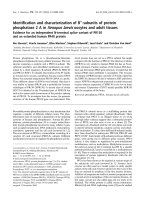Bài đọc 5.2. A sociable workplace is happier and more productive. Here's why (Chỉ có bản tiếng Anh)
Bạn đang xem bản rút gọn của tài liệu. Xem và tải ngay bản đầy đủ của tài liệu tại đây (178.5 KB, 3 trang )
<span class='text_page_counter'>(1)</span><div class='page_container' data-page=1>
<b>A sociable workplace is happier </b>
<b>and more productive. Here's why </b>
13 Nov 2018
<b>Dan Schawbel</b>Partner and Research Director, Future Workplace
Source:
It's not just the work you do, it's who you do it with.
Image: REUTERS/Erik De Castro
Today’s workers are more engaged and stay with their companies longer if they have
stronger team relationships. Work has become highly decentralized, with more
employees telecommuting and collaborative tools surpassing face-to-face
communication.
As a result, Gallup’s <i>State of the Global Workplace</i> found that 85% of the global
workforce is either not engaged or actively disengaged at work, costing companies
approximately $7 trillion in lost productivity.
By contrast, leaders that prioritize the socialization of their workforces see stronger
team commitment and an increase in productivity and organizational health.
Millennials have for years been stereotyped as the generation of job hoppers
</div>
<span class='text_page_counter'>(2)</span><div class='page_container' data-page=2>
But, like baby boomers and Gen X, many millennials have stayed with a company for
more than a decade, not because of the job security, but rather as a result of the
relationships they have with their teammates.
<b>A feeling of belonging </b>
“I’ve now been at General Mills 11 years and those friendships are definitely a massive
part of what keeps me here – it creates a strong feeling of belonging and affiliation,” says
Michelle Odland, director of marketing for Totino's and Old El Paso at General Mills.
“My close friends here are one of the key reasons I have stayed for 11 years so far, and
why I’m inclined to continue to stay,” said Jennifer Schopfer, general manager of
transport logistics at GE Transportation.
Millennials view their co-workers as their work family and their manager as their work
parent. It’s much harder to leave a family than a bunch of acquaintances you hardly see,
don’t get along with or with whom you don’t have an emotional connection.
Every leader can, and should, focus on creating a more socially engaging work culture
because it’s good for their own health and for their teams. In a global study by Future
Workplace and Virgin Pulse, we asked workers how leaders could help facilitate stronger
relationships at work.
Nearly half of respondents said team-building activities and social events and nearly
one-third said “workations”. Only 20% said using more collaborative technologies. A
proper balance of face-time with collaborative tools can keep employees connected while
making them feel like they belong.
Smart companies and their leaders realize the importance of team-building activities.
Workday, for example, used these to allow employees to participate in defining their
own experience.
“We were able to customize the floor to be optimal for the way product management and
development teams worked,” says Erin Yang, Workday’s vice-president of technology
product management, who was on a steering committee that helped design a new floor
of the firm’s San Francisco office. She asked her team to contribute office ideas and
share them on a Pinterest board. Through this team-building activity, the space was
more engaging and their relationships became stronger because they had worked on
something together as a team.
</div>
<span class='text_page_counter'>(3)</span><div class='page_container' data-page=3>
With 70% of people globally working remote at least once a week, companies are looking
to find ways to engage them and make them feel like they are part of the culture. At
Akamai, teams fly in to be together in person for an off-site. “This is expensive and the
output needs to justify the cost, but in my experience, the value for remote workers to
engage with people in person energizes their commitment to the team and the larger
organization,” says Ross Feinberg, vice president of strategy and operations at Akamai.
Leaders that create a more socially engaged workforce will be able to hold on to their
teammates for longer and have a healthy culture that makes everyone excited to work,
every day.
Today, work is about the actual work you do and who you do it with so it’s critical that
team relationships get prioritized, not just the work itself.
</div>
<!--links-->
<a href=' /> Gián án Những tiêu chí cơ bản đánh giá một tiết dạy.doc
- 1
- 681
- 1








